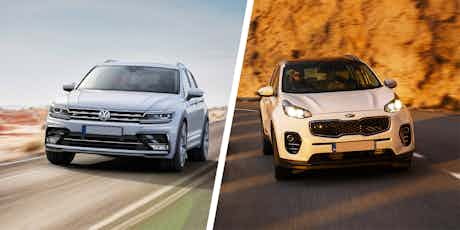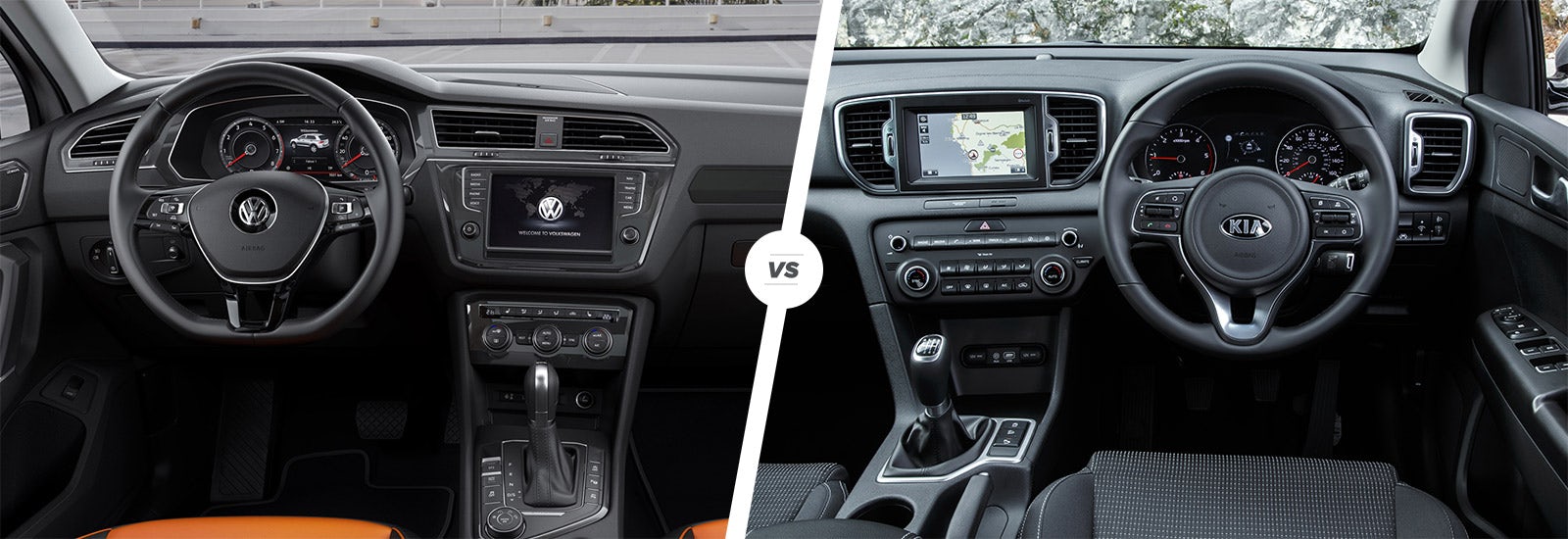Volkswagen Tiguan vs Kia Sportage comparison
February 15, 2016 by carwow staff

Volkswagen and Kia have both recently released new versions of their popular SUVs. The Tiguan builds on the success of the outgoing model which was a firm family favourite while the Sportage was one of the first Kias that could genuinely rival the class best. We’re putting the two new models head-to-head to help you decide which will suit you best. Volkswagen claims the new Tiguan has an increased emphasis on quality and even more space. Kia promises the Sportage has made a substantial step-up in terms of interior quality compared to its predecessor while adding a striking new look and continuing to offer a class-leading seven-year warranty. Spec up your ideal Kia Sportage in our car configurator to see the deals carwow could help you get. The new Tiguan isn’t available to order yet but there are great discounts on the outgoing model – put the Volkswagen Tiguan in our car configurator to see the savings.

Volkswagen Tiguan vs Kia Sportage – styling
These two cars are like chalk and cheese from the outside – Volkswagen is known for handsome-yet-reserved cars and the new Tiguan is no exception. The Volkswagen uses lots of straight lines and geometric shapes in its design lending it a chunky and modern appearance. Add smart alloy wheels and LED daytime running lights and you have a car with an understated, premium appeal. The Sportage is a lot more outlandish in its appearance. A slightly stretched wheelbase gives the Kia a noticeably more elongated profile, and smart rear lights add to the newfound premium look the brand is keen to nurture. The front end, with its gaping grille and high-mounted headlights, is a bit divisive and it remains to be seen whether buyers will get onboard with this bold new look.

Volkswagen Tiguan vs Kia Sportage – interior
Volkswagen tends to excel in terms of interior design and quality, and the new Tiguan’s cabin easily compares to some much pricier rivals, including the Audi Q5 and even the impressive new Mercedes GLC. Soft-touch materials and elegant detailing make the Volkswagen a lovely place to sit and buyers have the option of Volkswagen’s version of Audi’s virtual cockpit – a versatile replacement for the analogue instrument cluster. Kia has tried hard to emulate Volkswagen’s renowned interior quality in the new Sportage. To our eyes, some of the plastic surfaces don’t match those in the Volkswagen but the fit and finish is faultless. Nevertheless, there’s plenty of glossy plastic trim, a large infotainment screen and, in most places, soft-touch materials. It’s slightly disappointing that Kia has elected to fit a totally touchscreen infotainment system – neither it nor the Volkswagen’s unit are as easy to use as an equivalent BMW iDrive unit with its rotary controller but the VW’s shortcut buttons improve easy of use noticeably. The Tiguan nudges ahead in terms of space for passengers and luggage, too. Its larger design means there’s plenty of space for five to travel in comfort and a massive 615-litre boot – even bigger than the larger and more expensive Volkswagen Touareg. In comparison, the Sportage only offers 491 litres – not a bad effort but noticeably smaller than its rival’s. The Kia’s passenger space is nearly as impressive even if it isn’t as adept at seating three across the rear bench.

Volkswagen Tiguan vs Kia Sportage – driving
The Tiguan is based on the same MQB platform as the Volkswagen Golf and Audi A3 and, despite being noticeably taller and heavier, reports suggest it handles well resists the kind of body roll that usually afflicts SUVs. We expect it to keep the surefooted feeling of the previous generation, while improving on refinement and ride comfort. Kia has worked hard on the Sportage’s refinement but, in addition, has tried to make it a more entertaining car to drive. Ride quality has become a little stiffer as a result, but is still more than soft enough for motorway cruising. In terms of off-road ability, both cars have optional four-wheel drive, but it’s the Tiguan – in forthcoming off-road Escape trim – that’s more likely to get farther off the beaten track.

Volkswagen Tiguan vs Kia Sportage – engines
Volkswagen has bestowed the Tiguan with a comprehensive range of engines. Most buyers are expected to choose a diesel engine so there are four version of Volkswagen’s 2.0-litre four-cylinder with either 114, 148, 188 or 236hp. The latter two are quite expensive but the popular 148hp version has enough pace to satisfy most buyers while using admirably little fuel. Gearbox options include a six-speed manual or seven speed DSG automatic gearbox. If you’d prefer a petrol engine, you get four choices – 1.4-litre and 2.0-litre turbocharged engines each in two states of tune. The former offers either 123 or 147hp, and the larger unit comes with either 178 or 217hp – either would make a fine choice for those who do lower mileages or tend to drive around town. There should also be a plug-in hybrid Tiguan arriving later this year to compete with the Mitsubishi Outlander PHEV. The Sportage has to make do with fewer choices but it’ll be easy for buyers to find something they like. There are 1.7 and 2.0-litre diesels with the former producing 117hp, and the latter making either 138 or 178hp. Fans of petrol engines can choose between two versions of a 1.6-litre engine, a 176hp turbocharged one, and a non-turbo with 132hp. It’s likely that the mid-range diesel engine will be the most popular because it offers a good balance of running costs and performance.

Volkswagen Tiguan vs Kia Sportage – value for money
The Volkswagen should cost from around £23,000, but adding some choice options and a more powerful engine could see prices approach £30,000 with relative ease. Top-spec R-Line models running a cool £40,000 fully loaded. The Sportage is noticeably cheaper to buy, priced at just under £18,000 for the basic model. The Kia is very well equipped as standard, and comes with the brand’s excellent seven-year warranty. You can get a a top-spec Sportage with wireless phone charging, self parking and some other choice options, for slightly more than £30,000, but it’s worth noting the Kia is less likely to hold its value as well as the Volkswagen. In terms of running costs, the two cars are more or less a match, with relatively low insurance groups and road tax rates. Fuel economy figures for the Tiguan haven’t been released yet, but expect averages between 38mpg and 60mpg – putting it towards top of the class. The most efficient Sportage can return 61.4mpg on average.

Volkswagen Tiguan vs Kia Sportage – verdict
Without a doubt, the Kia Sportage is a greatly improved model compared to its predecessor, and now matches much of the competition in terms of interior quality and refinement, while adding a surprising but welcome dose of fun to the mix. It just remains to be seen how buyers take to the car’s styling – it could be pretty polarising compared to its stylish predecessor. The Volkswagen Tiguan, though, is a clear cut above its mainstream crossover rivals and, in terms of quality and design, can genuinely compete with models including the BMW X1 and Audi Q3 while managing to undercut them in price. The new Tiguan is a very important model for Volkswagen and it seems to have become one of the most likeable and talented vehicles in its line-up.

Save money on your new family SUV
If you’re sold on the new VW, you’ll have to wait until later in 2016 before you can order it. In the meantime, you can get great savings using our deals page for the current Volkswagen Tiguan. If the Kia wins it for you, check out our Kia Sportage deals page to see how much carwow could help you save. For more options, head over to our car chooser to narrow down your search.















